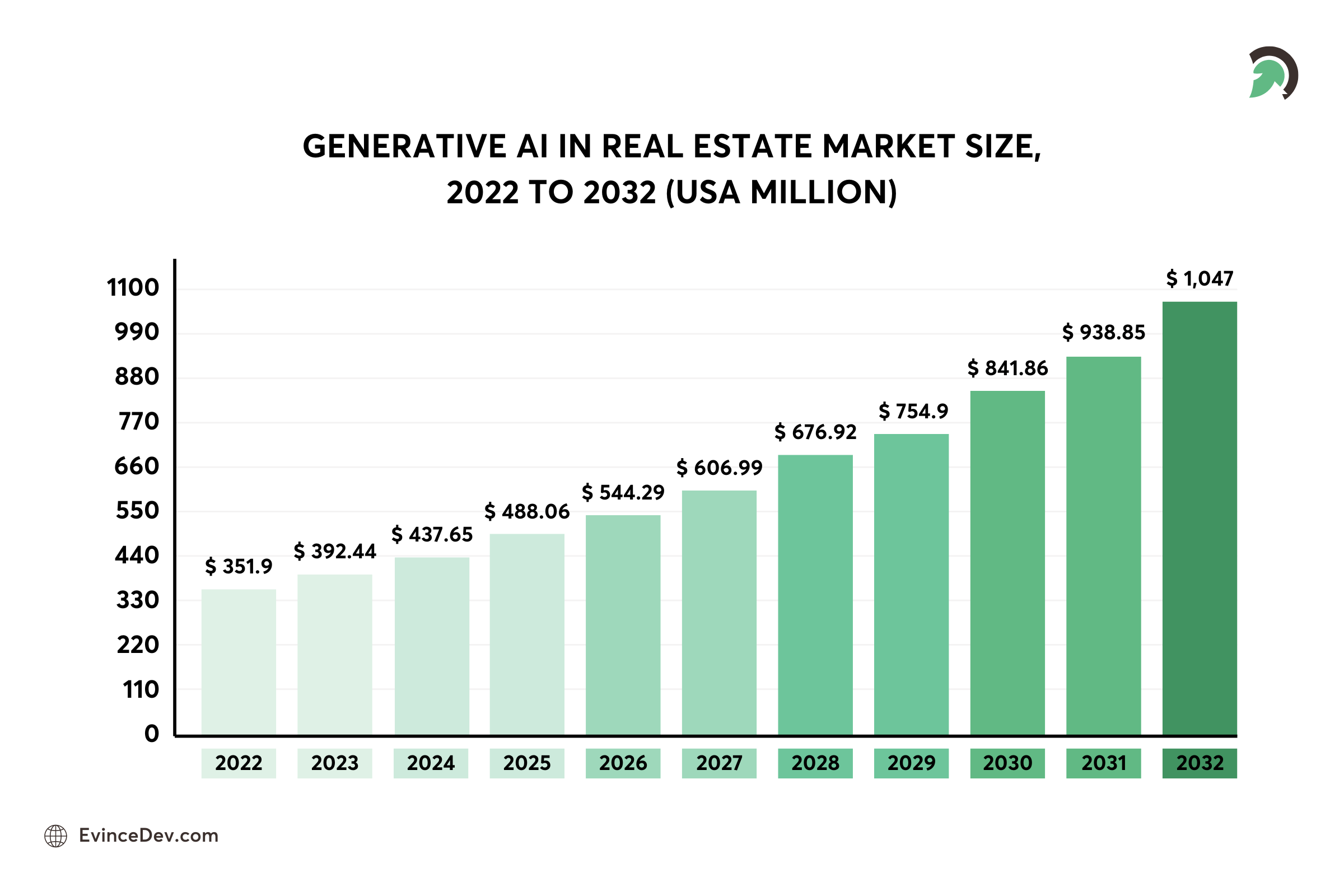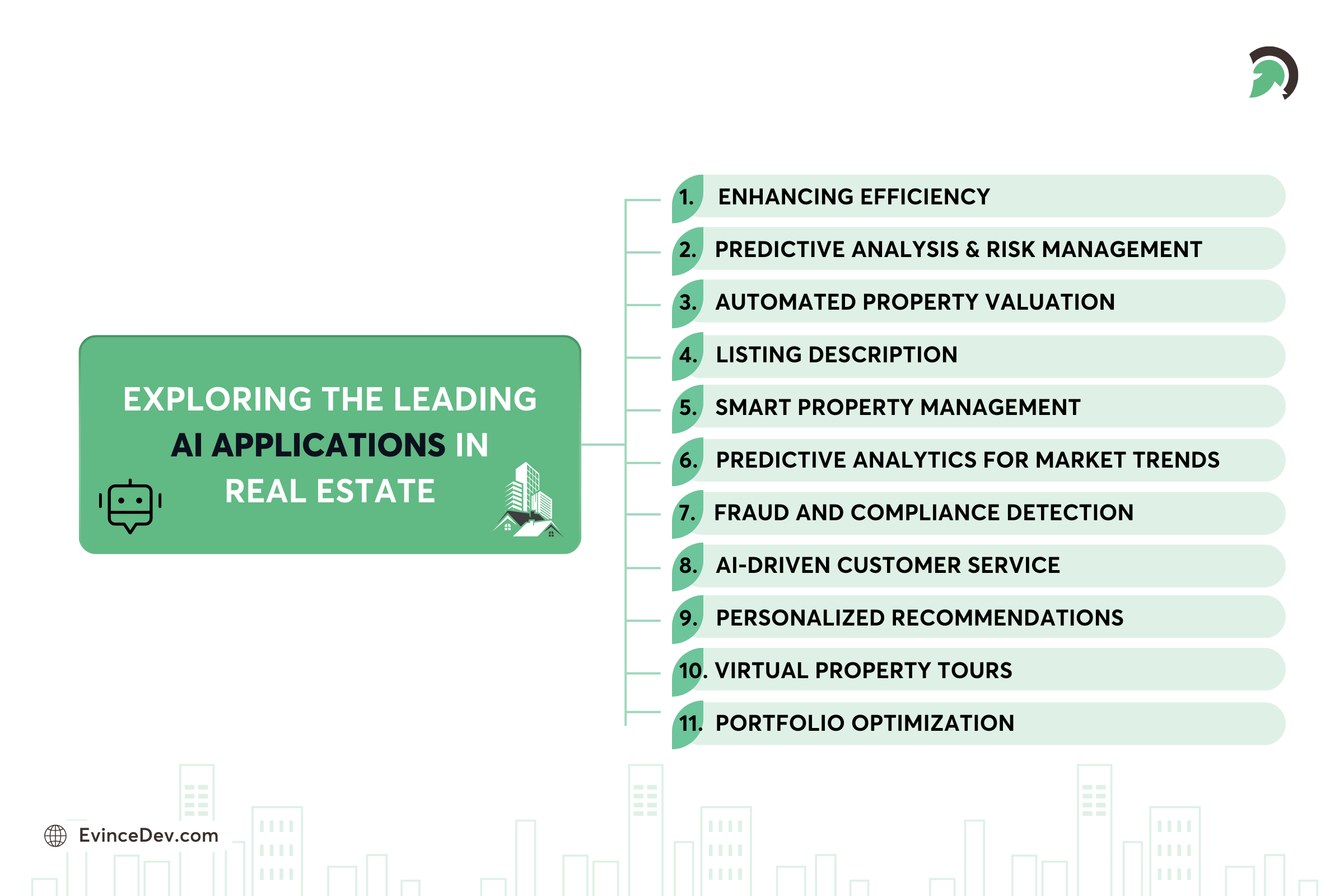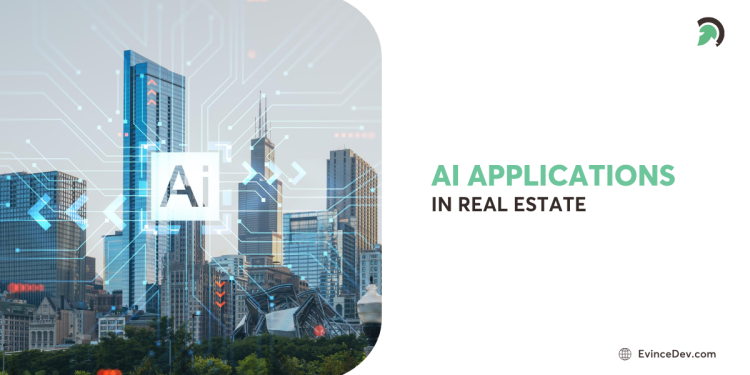Artificial Intelligence is the simulation of human intelligence processes by machines, particularly computer systems. In real estate, AI encompasses various applications such as data analysis, task automation, and enhanced decision-making capabilities.
AI plays a crucial role in real estate by providing insights that inform property management strategies, optimize operations, and improve tenant experiences. By leveraging data-driven insights, real estate professionals can make informed decisions that result in better outcomes for property managers, owners, and tenants. For instance, AI algorithms can analyze market trends and predict future property values, enabling investors to make strategic acquisitions or sales quickly. Artificial Intelligence can also enhance marketing efforts by identifying target demographics and tailoring advertisements to specific audiences, thus maximizing outreach and engagement.
Global generative AI real estate market was estimated at USD 351.9 million in 2022 and is expected to grow at a compound annual growth rate (CAGR) of 11.52% from 2023 to 2032, or roughly USD 1,047 million.

Shift from Traditional to AI-Driven Property Management
Traditionally, property management relied heavily on manual processes, leading to inefficiencies and potential oversights. However, the advent of AI technologies has revolutionized property management. Today, AI-powered tools can streamline everything from tenant screening to maintenance requests.
It allows property managers to focus more on strategic planning and tenant relationships rather than being bogged down by administrative tasks. Integrating AI enhances productivity and lays the groundwork for a more proactive approach to property management. For example, AI-driven predictive maintenance systems can analyze data from various building sensors to forecast when equipment is likely to fail, allowing managers to address issues before they escalate into costly repairs. Furthermore, chatbots and virtual assistants can provide tenants with immediate responses to inquiries, improving communication and satisfaction while freeing up human resources for more complex interactions.
How Does AI in Real Estate Work?
AI in real estate works by leveraging advanced algorithms, machine learning, and data analytics to automate and enhance various aspects of the industry. At the core, AI processes large volumes of data, such as market trends, property values, and customer preferences, to identify patterns and make predictions. For instance, predictive analytics helps real estate professionals forecast market trends and make informed decisions about property investments. AI-driven tools like automated property valuation systems can quickly assess a property’s worth by analyzing location, historical data, and current market conditions. Additionally, AI-powered platforms can generate personalized property recommendations for buyers, making the search process more efficient and tailored to individual preferences.
Beyond property valuation and market analysis, AI transforms real estate management and marketing aspects. For example, intelligent property management systems use AI to automate routine tasks like rent collection, maintenance scheduling, and tenant communication, reducing the workload for property managers. AI-driven chatbots enhance customer service by providing instant responses to inquiries. At the same time, virtual property tours use AI to create immersive experiences for potential buyers without the need for physical visits. By integrating AI, the real estate industry is streamlining operations and improving the overall experience for professionals and clients.
AI in Real Estate: Top Trend Applications

Enhancing Efficiency in Property Management
It has drastically improved through AI implementation. With AI tools, property managers can automate routine tasks such as rent collection, lease renewals, and maintenance scheduling. It reduces manual errors and frees up valuable time for property managers to engage with their tenants and address their needs.
Additionally, AI-driven analytics provide vital data insights, allowing property managers to make informed decisions about property enhancements, marketing strategies, and tenant retention efforts. The result is a streamlined operation that enhances the overall efficiency of property management. For instance, AI can analyze tenant feedback and preferences, enabling property managers to tailor services and amenities that resonate with their residents. It fosters tenant satisfaction and cultivates a sense of community within the property, which can significantly reduce turnover rates.
Predictive Analysis and Risk Management
Predictive analytics is one of the most valuable AI capabilities in real estate. Property managers can forecast future events by analyzing historical data and current trends, such as tenant turnover or maintenance issues. This foresight enables them to implement preventive measures, thus mitigating risks and ensuring seamless property operations.

Moreover, AI can identify potential risks associated with property investments, such as market fluctuations and economic downturns. Property owners can make more strategic investment decisions by accurately predicting these risks, ultimately leading to better financial outcomes. AI tools can simulate various market scenarios, allowing property managers to evaluate the impact of different strategies. It empowers property managers to not only react to changes in the market but also proactively shape their investment strategies, ensuring long-term sustainability and growth in a competitive landscape.
Automated Property Valuation
AI-powered automated property valuation tools use machine learning algorithms to assess the value of a property by analyzing factors such as location, size, condition, and recent sales of comparable properties. These tools provide more accurate and objective valuations than traditional methods, reducing human error and bias. Automated valuation models (AVMs) can generate real-time property appraisals, enabling buyers, sellers, and lenders to make decisions faster. By streamlining the valuation process, AI enhances efficiency in real estate transactions, improves transparency, and ensures fair pricing. It is precious in fast-paced markets where timely and accurate valuations are crucial.
Listing Description
AI enhances real estate listings by automatically generating compelling property descriptions based on key features and attributes. By analyzing property data, AI can craft engaging narratives highlighting a property’s unique selling points, such as architectural style and amenities. It saves time for real estate agents and ensures consistency and accuracy across listings. Additionally, AI-driven descriptions can be optimized for search engines, improving online visibility and attracting more potential buyers. By combining data-driven insights with creative language, AI helps to showcase properties more effectively, ultimately driving higher engagement and faster sales.
Smart Property Management
Smart property management leverages AI to streamline and automate various aspects of property operations, from maintenance scheduling to tenant communication. AI-driven systems can monitor building systems, predict maintenance needs, and even automate repairs, reducing downtime and operational costs. AI can enhance tenant experiences in residential properties by providing personalized services, such as smart home integrations and AI-driven concierge services. Property managers can also use AI to optimize energy usage, enhance security, and manage tenant feedback, ensuring higher satisfaction and retention rates. By automating routine tasks and providing valuable insights, AI enables property managers to focus on strategic decision-making.
Predictive Analytics for Market Trends
Predictive analytics leverages AI to analyze vast datasets, including historical property values, economic indicators, and consumer behavior. By identifying patterns and trends, AI can forecast future market conditions, helping investors and real estate professionals make informed decisions. It can predict price fluctuations, rental demand, and market shifts, enabling more strategic investments and portfolio management. AI-driven predictive analytics also assists in identifying emerging markets, optimizing the timing of property sales or purchases, and reducing investment risks. By offering data-driven insights, AI empowers real estate professionals to stay ahead of the competition and capitalize on market opportunities.
Fraud and Compliance Detection
AI is critical in detecting fraud and ensuring compliance in real estate transactions. By analyzing patterns and anomalies in large datasets, AI can identify suspicious activities, such as money laundering, false documentation, or unusual financial transactions. AI-driven systems can monitor regulatory changes and ensure that transactions meet legal requirements. It helps real estate professionals mitigate risks, avoid legal penalties, and maintain the integrity of transactions. AI’s ability to process and analyze vast amounts of data quickly makes it invaluable in combating fraud and ensuring all parties involved comply.
AI-Driven Customer Service (Chatbots)
AI-driven chatbots revolutionize customer service in real estate by providing instant, 24/7 support to potential buyers and renters. These chatbots can answer queries, schedule property viewings, provide property information, and even guide users through the buying or renting process. By leveraging natural language processing (NLP) and machine learning, AI chatbots deliver personalized and efficient customer interactions, reducing the workload on real estate agents. They can also collect valuable customer preferences and behavior data, helping agents tailor their services and marketing strategies. Overall, AI-driven chatbots enhance the customer experience, improve lead generation, and increase operational efficiency in the real estate industry.
Personalized Property Recommendations
AI-powered recommendation engines analyze user preferences, behavior, and search history to deliver personalized property suggestions. By understanding a buyer’s or renter’s unique needs and desires, AI can curate a list of properties most likely to match their criteria, saving time and effort in the search process. These personalized recommendations are based on various factors, such as location, price range, property type, and amenities. AI’s ability to process and interpret large amounts of data allows for more accurate and relevant recommendations, increasing the likelihood of successful transactions. Furthermore, AI chatbot development services enhance the overall user experience by offering real-time assistance and answering queries instantly. This personalized approach not only improves customer satisfaction but also boosts conversion rates in real estate.
Virtual Property Tours and Staging
AI-driven virtual property tours and staging offer a dynamic and immersive way for potential buyers to explore properties remotely. Using 3D modeling and augmented reality (AR), AI enables users to navigate a property, examine details, and visualize different interior design options. Virtual staging allows for the customization of spaces, helping buyers envision how a property could be furnished or renovated. This technology reduces the need for physical visits, saves time, and broadens the market reach to international buyers. AI-powered virtual tours and staging provide a convenient and engaging experience, making the property-buying process more accessible and efficient.
Portfolio Optimization
AI-driven portfolio optimization tools assist real estate investors in maximizing returns by analyzing and managing their property portfolios more effectively. It uses advanced algorithms to assess the performance of individual assets, identify underperforming properties, and recommend strategies for rebalancing the portfolio. AI can also forecast future trends, such as rental income or property appreciation, allowing investors to make data-driven decisions about buying, selling, or holding assets. By continuously monitoring market conditions and portfolio performance, AI helps investors minimize risks and achieve optimal returns. It is precious for large-scale investors managing diverse property portfolios.

Pros and Cons of AI in Real Estate
Pros
- Efficiency and Speed: AI streamlines various real estate processes, from property searches to transaction completions, reducing time and effort. Automated systems can quickly handle large volumes of data, providing real-time insights and recommendations.
- Data-Driven Decision Making: AI tools examine vast amounts of data to predict market trends, assess property values, and identify investment opportunities. It leads to more informed and accurate buyer, seller, and investor decisions.
- Improved Customer Experience: AI-powered chatbots and virtual assistants provide personalized services, answer queries, and guide clients through the buying or renting process, leading to higher customer satisfaction.
- Cost Savings: Automation reduces the need for manual labor, leading to cost savings in various operations such as property management, marketing, and customer service.
- Predictive Maintenance: AI helps identify potential issues in properties before they become significant problems, allowing for timely repairs and maintenance, which can extend the lifespan of the property.
Cons
- High Initial Investment: Implementing AI technologies can be expensive, requiring significant upfront costs for software, hardware, and training.
- Data Security and Privacy Issues: AI collects and analyzes large amounts of personal and property data, raising concerns about data security and privacy.
- Over-Reliance on Technology: Excessive dependence on AI can lead to reduced human involvement, which may affect the quality of personal interactions and decision-making processes.
- Job Displacement: Automation and AI can reduce the need for specific roles, potentially leading to job losses in property management and customer service areas.
- Bias and Discrimination: AI systems are only as good as the data they are trained on. The AI may make discriminatory decisions if the data is biased, leading to unfair property valuation or tenant selection practices.
Future of AI in Property Management
The future of AI in property management is brimming with potential. As machine learning evolves, we can expect even more advanced predictive analytics, smart building technologies, and enhanced tenant engagement tools. For example, integrating AI with the Internet of Things (IoT) will lead to smarter buildings that can monitor themselves, manage energy consumption, and optimize operational efficiencies automatically. These innovations will reduce operational costs and contribute to sustainability efforts as buildings become more energy-efficient and environmentally friendly.
Additionally, as data collection becomes more sophisticated, AI can tap into previously untapped datasets, allowing for richer insights and more precise predictions. It could lead to innovations in property assessment, investment strategies, and tenant experiences. For instance, AI algorithms could analyze market trends and demographic shifts to recommend optimal pricing strategies for rental properties, ensuring landlords maximize their returns while remaining competitive in the market. Furthermore, AI-driven virtual assistants could provide tenants 24/7 support, instantly addressing maintenance requests and inquiries, enhancing tenant satisfaction and retention.
AI-Powered Real Estate Solutions Tailored by EvinceDev
As AI continues to revolutionize various industries, adapting to these advancements is crucial for real estate businesses aiming to thrive in transformative era. Embracing real estate AI software development is the optimal strategy to remain competitive and capitalize on the benefits of this cutting-edge technology.
EvinceDev, a premier AI development company, stands ready to assist with its team of pre-vetted expert designers and developers. We deliver tailored solutions that cater to businesses of all sizes, empowering them to integrate AI seamlessly into their operations. Hire dedicated AI developers to infuse your real estate business with the power of artificial intelligence. Our custom real estate development solutions offer a competitive advantage, driving significant business growth.
As a leading web and mobile app development company, partnering with EvinceDev provides additional benefits, including timely delivery, flexible engagement models, and adaptable time zones. This ensures that businesses everywhere can access the best AI real estate development services.




